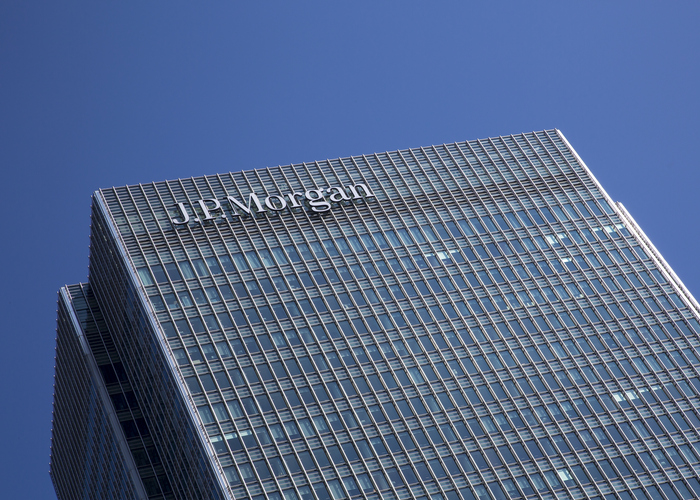ii view: JP Morgan loan losses reduce
Shares for this US economic bellwether are down around a quarter in 2020. Has it reached a turning point?
13th October 2020 15:48
by Keith Bowman from interactive investor
Shares for this US economic bellwether are down around a quarter in 2020. Has it reached a turning point?

Third-quarter results to the end of September 2020
- Net revenue down 0.3% to $29.94 billion
- Net income up 4% to $9.44 billion
- Earnings per share up 9% to $2.92
Chief executive Jamie Dimon said:
“I want to thank our employees around the world for their tireless work in helping our clients and communities impacted by the Covid-19 pandemic over the past several months. Despite significant
uncertainty in the environment, the Firm is unwavering in its commitment to drive an inclusive economic recovery, advance sustainable solutions to address climate change and improve the lives of our customers, especially those in underserved communities.”
ii round-up:
US banking giant JPMorgan (NYSE:JPM) has reported loan loss provisions of $611 million, down from $10.4 billion in the previous quarter and way below analyst expectations of nearer $2 billion.
As such, earnings per share came in at $2.92 per share, up from $1.38 per share in the second quarter and surpassing analyst forecasts of around $2.25 per share.
JP Morgan shares rose by more than 1% in pre-market US trading having fallen by over a quarter year-to-date. Shares for Asian focused lender HSBC (LSE:HSBA) are down by around a half in 2020, while shares for UK concentrated Lloyds Banking Group (LSE:LLOY) are down by more than 55%.
A rebound in global markets from pandemic induced second-quarter lows also helped market related revenues jump by 30% to $6.6 billion. Fixed income revenues climbed by 29%. Equity related revenue improved by 32%.
Its asset & wealth management business reported record sales and profit given strong net inflows. Assets under management climbed by 16% to $2.6 trillion. Fellow Wall Street bank Morgan Stanley (NYSE:MS) recently announced the $7 billion acquisition of investment manager Eaton Vance.
Less favourably, net interest income retreated 9% to $13.1 billion, hit by central bank actions to keep interest rates ultra low. Higher rates give banks more scope to widen the difference between deposits and lending rates – borrowing from customers at deposit rates and lending out as loans at higher rates.
As for shareholder returns, last month the bank declared a quarterly dividend of 90 US cents per share, unchanged from the previous three quarters and providing an annual income yield in the region of 3%. However, its share buyback programme remains suspended. As in the UK, US regulators have been urging caution with regards to shareholder returns given the unknows of the global pandemic.
ii view:
JP Morgan is a highly diverse US banking giant. Its operations cover both traditional consumer and corporate banking along with investment banking and asset management. With North America generating around three-quarters of its revenues, the bank is seen as offering a broader health check on the wider US economy.
Today’s significantly reduced loan loss provisions suggest that the height of bad debts might be behind JP Morgan. A reopening of businesses following total shutdowns under pandemic lockdowns, and management’s likely desire to get ahead of the game by possibly over provisioning early on, are potential factors at play.
For investors, the help given to JP Morgan’s trading divisions by increased market volatility due to the pandemic may not be repeated in coming quarters, potentially removing a large earnings tailwind. The dampening impact of ultra-low interest rates on returns also looks unlikely to change any time soon. But the significant reduction in loan losses does inject some optimism, which adds to the chief executive’s ongoing description of what he calls the bank’s “fortress balance sheet.” In all, while bumps in the road ahead look inevitable, some turning point may have been reached.
Positives:
- Business diversity
- Increased capital and liquidity position
Negatives:
- Share buyback programme suspended
- Lower interest rates are broadly bad for bank profitability
The average rating of stock market analysts:
Buy
These articles are provided for information purposes only. Occasionally, an opinion about whether to buy or sell a specific investment may be provided by third parties. The content is not intended to be a personal recommendation to buy or sell any financial instrument or product, or to adopt any investment strategy as it is not provided based on an assessment of your investing knowledge and experience, your financial situation or your investment objectives. The value of your investments, and the income derived from them, may go down as well as up. You may not get back all the money that you invest. The investments referred to in this article may not be suitable for all investors, and if in doubt, an investor should seek advice from a qualified investment adviser.
Full performance can be found on the company or index summary page on the interactive investor website. Simply click on the company's or index name highlighted in the article.